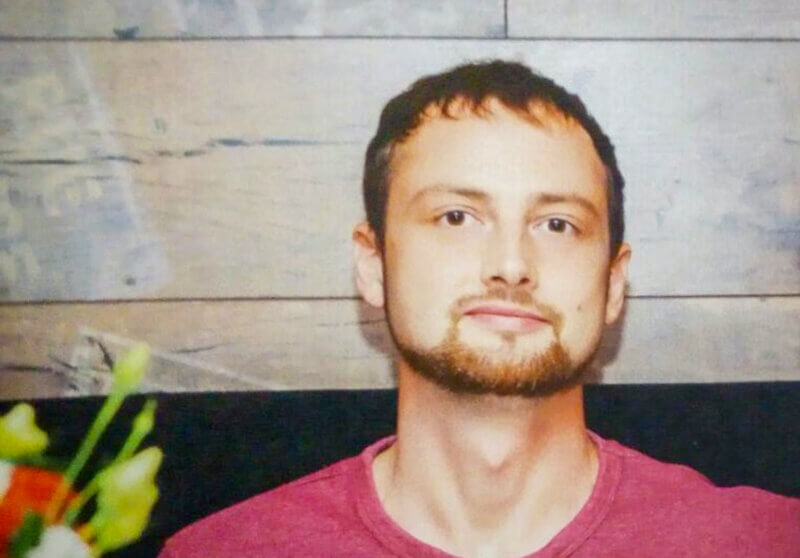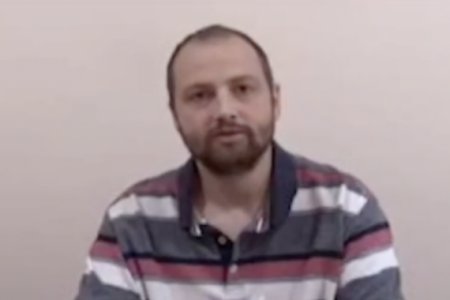>
Yaroslav Zhuk has stated in a Russian court that he was beaten and tortured with electric shocks by the staff of the Rostov SIZO, or remand prison, where the Ukrainian from occupied Melitopol is illegally held. Zhuk is on ‘trial’ at the Southern District Military Court on charges backed only by multiple ‘confessions’ which Zhuk has said were extracted through torture and which he retracted as soon as he was able to see a lawyer.
Crimean Process reported on 6 June that Zhuk’s ‘trial’ had begun in Rostov. That this will be a judicial travesty is clear, and not merely because of the Southern District Military Court’s notorious role in the political persecution of well over a hundred Crimean Tatar and other Ukrainian political prisoners. Zhuk, a Ukrainian volunteer was living in his native Melitopol when he was abducted and tortured by the security service of aggressor state that had invaded his country. That aggressor state is claiming the right to accuse Zhuk of something it calls ‘an act of international terrorism’ and to ‘try’ him for this in a Russian court.
At the very beginning of the hearing, Zhuk stated that from 29-30 May he had been brutally beaten by staff at the Rostov SIZO. He said that the staff had forced him to the floor and poured cold water over him before they began beating him and using a Taser gun as a torture weapon. His torturers had forced him to keep his head down, so he could not identify the men, but said that there had been three men who asked him questions about “links with members of prohibited organizations”. Zhuk said that he still had the marks from his beating, but the court rejected the defence’s legitimate application for the assault to be separately investigated, and claimed that the prosecutor would initiate a check “should violations of legislation be found”. Judges from this same court have systematically ignored evidence that Ukrainians have been subjected to torture, and frequently obstruct those giving testimony about such treatment. Zhuk also said that the SIZO administration had not provided him with any bed linen or even a mattress, and he was forced to sleep on the floor.
The Russians begin abducting Ukrainian civilians in any part of Ukraine that falls under their control. Ukrainian defenders or veterans, public officials or members of their families are most at risk, as is anybody known to have a pronounced pro-Ukrainian position. Some of the hostages are released, often after savage torture, while others disappear without trace. Some are held incommunicado and tortured before being taken to Russia and charged with so-called ‘acts of international terrorism’ (Article 361 of Russia’s criminal code). This is a new charge, only introduced in 2016, and had not, until Russia’s full-scale invasion of Ukraine, ever been applied. A so-called ‘act of international terrorism’ refers to an explosion, act of arson or other actions, committed outside Russia and jeopardizing the life, health, freedom or inviolability of Russian citizens “for the purpose of violating the peaceful co-existence of states and peoples, or aimed against the interests” of Russia.
While held prisoner in occupied Crimea, Zhuk was about to provide details about his abduction and the torture used to force him into signing multiple confessions. He explained that he had been seized on 17 June, when armed men blocked his car, and then took him away by force and with a bag over his head. He was taken to some basement where he was subjected to such torture that, on several occasions, he lost consciousness. Among the forms of torture used to extract ‘confessions’ were electric shocks, inflicted through wires being attached to parts of his body, including genitals; earlobes or testicles, with the Russians then turning on an electric current, His torturers also beat him with a blunt instrument over his entire body and hey burned his feet with a lit gas burner. He was not given any food at all during the first week, only a tiny amount of water each day.
He eventually couldn’t endure such torture anymore and agreed to ‘confess’ to whatever they demanded of him. At that point he was taken, blindfolded, to another premises, without any light or water, where “they got me to sign a printed confession to fabricated charges.” He says that there were, in fact, three distinct versions of the ‘confession’, each of which he was tortured into signing. He was then forced to learn the text of (one) ‘confession’ and read it out before a video camera. They waited for this, however, until the torture marks on his face had cleared.
Zhuk asserts that they also forced him into holding (and therefore leaving fingerprints) on various items and substances. Identical methods have been reported by other hostages, facing such ‘international terrorism’ charges.
Zhuk was held in this basement from 17 June to 8 August, before being taken by force to occupied Crimea, to the Simferopol FSB. It was around a month after his seizure that Russian state media claimed that ““the saboteur who made an attempt on the life of the Russian-installed 'director' of the Melitopol department of education’, Olena Shapurova, had been ‘detained’. They cited, as their source, Vladimir Rogov, a collaborator installed by the Russians in Melitopol and the video he posted on his Telegram channel, in which Zhuk, was seen alone, supposedly ‘confessing’ to the attack, and saying that he is part of the partisan movement, under the command of Ukraine’s Security Service [SBU].
Zhuk gave these ‘confessions’ while totally under the control of his captors and retracted them as soon as his detention became ‘official’ and he had access to a lawyer. All of this is similar to the Russian FSB’s behaviour with respect to Ukrainian political prisoners since 2014. There is also tacit confirmation that the ‘confessions’ were extracted through excruciating torture in the fact that Zhuk even claimed that Ivan Fedorov, Mayor of Melitopol and a former hostage himself, had been part of the alleged ‘act of international terrorism’.
It was only on 11 August 2022, after almost a month held incommunicado and without any formal record of his captivity, in captivity that a Russian-controlled ‘court’ in occupied Crimea ordered that Zhuk be remanded in custody in the Simferopol SIZO.
Crimean Process reports that the indictment read out during his first ‘hearing’ accuses Zhu of planning “to commit an act of international terrorism by blowing up two explosive devices. Zhuk denies the charges and says that he had only one explosive device. Most importantly, he insists that he is a combatant and should be treated as a prisoner of war.


